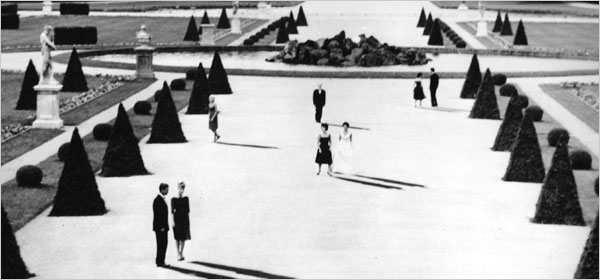THE ACT OF MEMORY, “LAST YEAR AT MARIENBAD” & THE THING OF INTENTION

SUBJECTIVITY OF MEMORY
Suzanne Corkin’s book Permanent Present Tense: The Man with No Memory, and What He Taught the World chronicles the fascinating case of Henry Molaison. Upon receiving a catastrophic lobotomy at the age of 27, Molaison continued his life as an individual incapable of forming new memories. For the remaining 55 years of his life, Molaison was closely studied by Corkin: his unique tragic circumstances constituted him as a one of a kind empirical specimen of anterograde amnesia, the medical term for his inability of forming new memories. Corkin found in him the ideal means to gain a deeper scientific understanding in the field of neuroscience[1].
Unlike the Drew Barrymore character in 50 First Dates, Molaison spent his amnesic reality in the company of a meticulous observer and not the romantic goofiness of Adam Sandler. The focus of Corkin’s book is the scientific exploration of how new memories are cerebrally processed. Corkin observed the short-span consciousness of Molaison’s new memories along with the variation of the feelings and thoughts he exhibited, as everyday provided a new opportunity to reassess her specimen all over, evaluate and reevaluate the pertinent data. Despite the repetitive occurrence of the same questions within his short-span of memory, Molaison’s responses were sometimes indicative of the formation of new memories. This analysis served as a catalyst for a new neuroscientific theory: contrary to previous popular belief that memories “were indelible snapshots of sense experience, stored in chronological sequence like the frames of a celluloid film,” memories are actually located in more than one location in our brains.
Mike Jay’s exceptional review of Corkin’s book[2], aptly entitled “Argument with Myself,” starts with a powerful definition of memory. Jay concedes that memory shapes one’s identity, but he argues that in addition it simultaneously functions as the (mis)apprehension of a well-founded, whole self: “memory is not a thing but an act that alters and rearranges even as it retrieves.” In this framework, it is evident that the way we conceive our individual realities, as they are constructed by all the memories we hold, are suspect. The manner in which all of us accentuate the details of what happens, both to us and in the world surrounding us is marked by subjectivity. While the degrees of each person’s paranoia and tendency for narrative exaggeration vary, there is no doubt that in most “realities” much is not real.
In an endeavor to make her students grasp this very fact, Mary Karr once began teaching a creative writing course by performing getting in a huge spat with the educational institution’s program director[3]. Once the program director exited, Karr revealed to her students the argument they had witnessed was a simulation. She then asked them to write down their observations and perception of the incident. The students had an arduous time reaching consensus on a collectively agreed objective account of what had just happened in their classroom. This exercise swiftly presents the validity of the very ambivalent nature of objective memories.
10 part lecture by Alain Robbe-Grillet
Beginning with Part 2, as Part 1 is a very long introduction to his work. Overall it’s kind of slow going as he requires a translator, but still interesting and worthwhile if you have the time. Parts 3-10 available thru links thereafter.
See also: this documentary by Luc Lagier on Last Year at Marienbad, directed by Alain Resnais, and cowritten by Robbe-Grillet (available now from Criterion).
